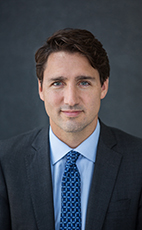Representative Justin Trudeau Contact information
Here you will find contact information for Representative Justin Trudeau, including phone number, and mailing address.
| Name | Justin Trudeau |
| Position | Representative |
| State | Quebec |
| Party | Liberal |
| Born | 1971 |
| elected | 2021 |
| Mailing Address | Ottawa, Ontario, Canada K1A 0A6 |
| Phone | 613-992-4211 |
| Mailing Address | 1100 Crémazie East Suite 220 Montréal, Quebec H2P 2X2 |
| Phone | 514-277-6020 |
| fax 1 | 613-947-0310 |
| Email Form | |
| Website | Official Website |
Justin Trudeau for Representative
Justin Trudeau is a Canadian politician who served as the 23rd Prime Minister of Canada from 2015 to 2021. Born on December 25, 1971, in Ottawa, Ontario, he is the second-youngest Canadian Prime Minister in history. Trudeau is a member of the Liberal Party of Canada and has been actively involved in politics for most of his life.
Trudeau is the eldest son of former Canadian Prime Minister Pierre Trudeau and Margaret Sinclair. Growing up in a political household, he was exposed to the world of politics from an early age. After completing his education, Trudeau embarked on a diverse career path that included teaching, engineering, and advocacy work.
In 2008, Trudeau entered politics and successfully won the Liberal Party nomination in the Montreal electoral district of Papineau. He faced off against the incumbent Member of Parliament and emerged victorious in the 2008 federal election. Trudeau quickly gained attention for his youthful energy, charisma, and progressive stance on various issues.
Trudeau’s rise within the Liberal Party was rapid. In 2013, he was elected as the leader of the party, revitalizing its base and attracting a new generation of supporters. During his leadership campaign, Trudeau emphasized the importance of inclusivity, transparency, and social justice, which resonated with many Canadians.
In the 2015 federal election, Trudeau led the Liberal Party to a remarkable victory, securing a majority government. His campaign focused on promises of positive change, economic growth, and environmental sustainability. Upon assuming office, Trudeau implemented several key policies, including the legalization of recreational cannabis, the introduction of carbon pricing, and the resettlement of Syrian refugees.
Trudeau’s leadership style and policies have drawn both praise and criticism. Supporters commend his efforts to strengthen Canada’s international standing, promote gender equality, and tackle climate change. However, critics argue that his government has not done enough to address certain issues, such as Indigenous rights and economic inequality.
Throughout his tenure, Trudeau faced several challenges, including a controversy involving his vacation on the Aga Khan’s private island, allegations of inappropriate conduct with female members of parliament, and the SNC-Lavalin affair, which involved accusations of political interference in a criminal case. Despite these setbacks, Trudeau maintained a significant base of support and successfully secured re-election in the 2019 federal election, albeit with a reduced majority.
Trudeau’s time as Prime Minister came to an end in 2021 when his party lost its majority in the House of Commons. Following the election, he announced his intention to step down as leader of the Liberal Party. Despite the challenges faced during his tenure, Trudeau leaves a lasting legacy as a leader who prioritized progressive values, youth engagement, and Canada’s role on the global stage.
Outside of politics, Trudeau is known for his athletic pursuits, including boxing and snowboarding. He is married to Sophie Grégoire Trudeau, and they have three children together. Justin Trudeau’s impact on Canadian politics and his journey as a leader continue to shape the country’s political landscape.
